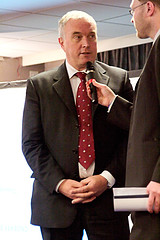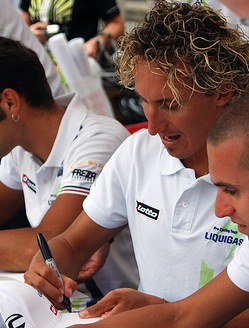 When I began following this sport, one of the first things that struck me were riders’ reactions to anti-doping efforts. Granted, no one likes being woken up early—all the more so if the early wake-up comes with a blood test. But I’d imagine getting smeared across the Pyrenees by 25 guys cranking oxygen to their muscles through erythrocyte smoothies is an infinitely less pleasant experience. So why the resistance?
When I began following this sport, one of the first things that struck me were riders’ reactions to anti-doping efforts. Granted, no one likes being woken up early—all the more so if the early wake-up comes with a blood test. But I’d imagine getting smeared across the Pyrenees by 25 guys cranking oxygen to their muscles through erythrocyte smoothies is an infinitely less pleasant experience. So why the resistance?
To put in bluntly, the anti-doping moving sucks at PR. In case the legions massing in various public spaces with poorly-spelled signs hadn’t tipped you off, people hate notion of being told what to do—especially if it’s allegedly for their own benefit. Imagine what the Tea Party protests would be like if Dick Pound were running the US Government and I think you get a sense of how the peloton felt half-a-decade ago.
Granted, those carrying out the tests didn’t have an easy task—they’d fallen dangerously far behind the dopers in terms of technology, and drug abuse had spread to the point that team cars could essentially roll up at the stage finish and hand out refrigerated bags. But the midnight raids and rampant speculation were the wrong approach, upsetting the riders’ union, and prompting protests, both on the race course and in the courtroom.
Change came incrementally. Pound left. The UCI hired Anne Gripper, and started a surprisingly good athlete education program. And most importantly, riders started getting caught. Floyd Landis became the first rider to lose the Tour to a positive test. Michael Rasmussen had the Yellow Jersey ripped from his shoulders. Dazzling protagonists like Ricco and Vinokourov were bounced mid-Tour. And while I disagree with the specific circumstances surrounding the ’06 Puerto suspensions, they certainly went a long way toward cranking up rider perception of the risks involved with doping.
Earlier this week, upon the announcement that three riders would be blocked from starting the Giro based on their biological passport findings, a couple riders congratulated the UCI on Twitter—without a detectable note of sarcasm. While a vocal minority has always condemned dopers, the unsolicited, positive response of individual riders to a suspension marked—for me, anyway—a pretty significant turning point.
 Alas, the UCI still has a few tricks to learn. The suspension of Pellizotti, Prado, and Valjavek, was, as a certain Vice President might say, a big effing deal. This was the first major suspension announced under the biological passport program, and cycling’s governing body dropped it off as unceremoniously as I might dispose of last night’s dinner.
Alas, the UCI still has a few tricks to learn. The suspension of Pellizotti, Prado, and Valjavek, was, as a certain Vice President might say, a big effing deal. This was the first major suspension announced under the biological passport program, and cycling’s governing body dropped it off as unceremoniously as I might dispose of last night’s dinner.
From the horrific press release, which seems to have been optimized to avoid search engine results, to the lack of specific data on what makes these riders’ information abnormal, the UCI has created a massive information vacuum, into which all sorts of interesting excuses have rushed. It’s not a good when I’m only reading about the specifics of a positive test from the people trying to rebut it.
And it’s not some vanishing-twin longshot we’re talking about here. The biological passport program is a good idea, something that probably needs to happen, for cycling and for sport in general. These cases are clearly going to be its first major legal test, and right now the UCI seems to be doing everything in its power to make sure it loses the case.
I’m with you. I put something very similar on my blog:
“Think about it, this news could be spun as a triumph for the UCI. You’d hope President Pat McQuaid, chief medic Mario Zorzoli and new anti-doping boss Francesca Rossi would be hosting a press conference right now, bragging about catching several riders with this innovative method. You could almost imagine the riders in question stuffed and mounted, like hunting trophies or being perp-walked by UCI chaperones. But alas, the news has leaked out, the internet is ablaze and the UCI’s on the backfoot.”
Hey, I love pro-cycling (I like amateur racing better because they let me play) but am woefully uninformed about all of it -. I watch a few classics, my parents Tivo the exciting parts of the Tour for me, etc, so I’m not way current on things.
I was under the impression that Landis’ positive came waaaay before Dick Pound left. Am I way off?
I’m not defending Floyd but it doesn’t seem to me that he got a fair shake and that Dick Pound was a part of that.
Are you suggesting you disagree with all the 06 suspensions or that you lump Floyd in with new successes of anti-doping measures?
Thanks.
@Johnboy: Landis got as fair a shake as anyone can get.
His A and B samples came up positive, both for an out of whack T/E ratio, and for exogenous testosterone. He had a complete trial before an American Arbitration Association panel and lost, appealed to the Committee for Arbitration in sport and lost that too, finished out his suspension, and is back racing on the US domestic circuit.
While it’s true Dick Pound said some things no WADA chairman should say during the investigation and trial, but wasn’t presiding over the case and had no real role within the investigation.
I found Landis’ positive to be poetic justice, because so many riders were banned from starting that Tour (2006) without any positive tests or due process—just suspicion and a days-old investigation into Spanish dope doctors lab. That’s no way to “clean up” a sport.
Though many of the names involved in Opercion Puerto—maybe finally even Valverde, who was allowed to start in ’06—have since confessed or been caught, a few (Allen Davis comes to mind) were exonerated completely, meaning they were stopped from racing for no reason.
Cosmo. Always love your angle. However, if you place a photo poking fun at improper use of inglisch, don’t shoot yourself in the foot by following it up with sloppy editing. I have time, always online, willing to help.
p.s. A nail in the SNOB coffin would be a book of your own. In the works?
@Johnboy: I’m with Cosmo on this one.
Landis came to his trial with all sorts of excuses but failed to appropriately answer the one question that was central to his suspension – “How did exogenous testosterone become present in your blood stream?”
Exogenous testosterone = not naturally occurring in the body = that which is ‘external’.
This has nothing to do with French labs, crossed out label dates etc.
Just answer the question Floyd…
Cosmo, agreed UCI could be doing better by providing more info, this is a good point.
But why do we see little to zero negative editorial content on the timing of the announcements and penalties?
To quote another source, Pellizotti was pulled for “abnormal variation in the readings of a control undertaken by the UCI on the eve of the 2009 Tour de France.” Um, more than 9 months ago?? You’re freakin kidding me right? And the UCI give his team, what, a month before the Giro to work out another plan? How about you ban him in the off-season and they hire another rider – that would be fair to the team (assuming they’re not involved).
Honestly this seems to me to be the equal-biggest concern with doping investigation (the other being enforcement of bans for those who’ve been caught, can you say “Alejandro”).
Of course if someone is caught during the race then pull them – but by that I mean the sample taken during the race is tested DURING the race period (or very shortly after) and action then taken. If more money needs to be spent for dedicated testing, then do it, spend it.
The PR will be so much easier to say “hey we got this guy red-handed last week and he’s out”, than “hey we got results from LAST YEAR back and we’re gonna pull him NOW before the start of the next big race, and all your team planning, other rider’s preparation, and fan expectations and hopes, can just get tossed out the window.”
It would also present a more respectable image of cycling, ie. when someone cheats we catch them, NOT, when someone cheats we might eventually catch them one year later. I know we are on the right track with anti-doping efforts, but with the effect a simple announcement had on BMC, and late announcements like this one against Pelizotti (though I have no bias for or against him), I feel I am losing faith in the sport at this level.
Dave, could it be simply that it’s taken 9 months of results for the UCI to actually be able to confidently say the one before the TdF was abnormal?
If they had jumped earlier there could have still been enough reasonable doubt for the rider to get off. But by waiting they finally had enough tests, over a significant enough time frame, to be able to make the decision they have.
Just a thought….